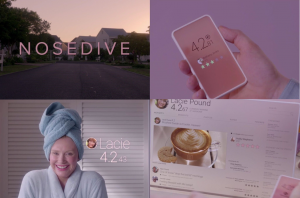Last week Boris Johnson told us life would be back to normal from 21st June and the collective sense of relief that ‘this’ might end soon could be felt reverberating through society.
But will we just go back to normal? And what does that normal even mean anymore? What type of future do we want?
I recently watched Can’t Get You Out of My Head: An Emotional History of the Modern World created by Adam Curtis, which aims to provide some sort of understanding of ‘how we got to here’ covering love, power, money, ghosts of empire, conspiracy theories and artificial intelligence. He outlines three possible futures – one in which individualism will disappear, one in which it will be like the past and finally one in which a whole new type of future is imagined.
He outlines three possible futures – one in which individualism will disappear, one in which it will be like the past and finally one in which a whole new type of future is imagined.
You may be thinking that all of this has nothing do with media planning or advertising or communications or marketing or brands or business. But we live in an interconnected world and advertising is either the lubricant, or the hand on the throttle, or the poetry of capitalism dependent on your point of view. And our ability to create effective communication is intrinsically linked to contexts and values. However, when those values start to change the whole narrative changes and thus how you communicate needs to change as well. So, how we emerge from this pandemic has everything to do with media planning and communications and advertising and marketing and brands and businesses. Here’s an outline of the 3 paths we could take.
1. Individualism will disappear and with it the very idea of individual freedom
Curtis says the following in regards to the first potential future in that “As has already begun in China, data will be gathered and used on a massive scale to predict and manage all human behaviour in the way that the psychologist BF Skinner predicted. Skinner said that individualism would be just a brief moment in history before science would find a way to manage and control everyone.”
Experts say the coronavirus has given the Chinese government a pretext for accelerating mass surveillance with estimates of surveillance cameras increasing from 200m to 626m this year. In a Guardian article in the early stages of the pandemic Alex Zhang, 28, who lives in Chengdu, refers to Italian philosopher Giorgio Agamben’s theory on the state of exception, and how measures taken during a state of emergency can be prolonged.
“This type of governance and thinking for dealing with the epidemic can also be used for other issues – like the media, citizen journalists or ethnic conflicts. Because this method has been used before, citizens will accept it. It becomes normal.”
In Israel they have recently introduced ‘freedom bracelets’ as an alternative to mandatory two-week quarantine for people entering from other countries. They’re essentially the ankle bracelets used for tracking and monitoring prisoners but worn on your wrist and look like a smartwatch.
It could be that Charlie Brooker had it right in the pastel, playful satire about modern insecurity Black Mirror – Nosedive episode set in a near future world where people can rate each other from one to five stars for every interaction which then impacts their status in society. It’s not a million miles away from the reality of China’s Social Credit System.
2. The future will be like the past
The second possible future Curtis talks about is one in which “Many people are hoping with the election of Joe Biden in America, it will be possible to return to an old stability where individualism can continue to be managed by a benign elite.”
He goes on to talk about the issue’s underneath society, the pressures building up that won’t go away and how everyone has run out of new ideas.
Last year at EffWeek 2020, Professor Marcel Danesi talked about how before the bubonic plague in the 1300s the narrative of the time was that life was a spiritual journey, thus people’s lives were guided by the seven deadly sins, religion and truth. After the plague the narrative started to change, and it became more about life as a human journey.
Has COVID changed the existing narrative? Danesi thinks so. He believes the unifying theme now is ‘life must change’ and reflects how COVID, racial discrimination and systemic racism, and climate change all need to change as part of a new type of future. The most effective communication will now shift to reflect this narrative.
Building on the climate change point in a recent post by Cultural Strategist Florencia Lujani about “Building Businesses For Permanence, not Performance” she highlights a quote from James Hickel in ‘Less is More’ (2020) which puts the climate and the economy in connected, tangible terms:
“The current system requires annual growth of roughly 3% to avoid the shock of recession. This means doubling the size of the economy every 23 years. The economy of 2000 must be 20 times larger in the year 2100, and 370 times larger in the year 2200. Yet 2000 was the first year that humanity used more energy and materials than the safe limit.”
We simply can’t go back to how things were before.
3. Create genuinely new kinds of futures, ones that have never existed before
Curtis thinks that “we as individuals will have to regain the confidence that we have lost in this frightened and uncertain time. The one thing that is certain is that the world of the future will be different and that the people in that future will think and feel differently too. If we can regain our confidence, we will find that we have the power to influence how that future turns out. And as a first step we have to start imagining what kind of future it is we want to build.”
Similarly, Shosana Zuboff wrote in Surveillance Capitalism that “If the digital future is to be our home, then it is we who must make it so.”
It is up to us to imagine new possible futures and create a better world.
Last week in the FT Martin Wolf highlighted how the UK economy has an innovation and growth crisis, that we need to understand why the UK has such a weak position in high-technology manufacturing and why it invests so little overall. If we are not innovating, we will simply not grow. This runs from the top to the bottom of every company.
As an industry the commitment to AdNetZero and the work of Ben Essen and Caroline Davison around ‘eco-effectiveness’ which was launched at EffWeek 2020 last Autumn are movements in the right direction from a climate change perspective. More may be needed though with Bill Gates saying that “solving Covid is easy compared to climate change”.
Maybe that’s why businesses are paying Sci-Fi writers to predict their futures. It’s been called a number of things including sci-fi prototyping, futurecasting, or worldbuilding, but the goal of these companies is generally the same; to help clients create forward-looking fiction to generate ideas and IP for progress or profit. Each of the biggest practitioners believe they have their own formulas for helping clients negotiate the future. And corporations like Ford, Nike, Intel, and Hershey’s, it turns out, are willing to pay hefty sums for their own in-house Minority Reports.  As Sophia Bruekner (pictured) said, “people’s ability to envision the future tends to fall between two unhealthy and unconstructive extremes. On one side, there are those who are blindly optimistic about technology. At the other extreme are those so critical of technology that they adopt an unrealistic Luddite attitude, avoiding technology altogether; or they assume that a dystopian future is inevitable and, as a result, become passive.”
As Sophia Bruekner (pictured) said, “people’s ability to envision the future tends to fall between two unhealthy and unconstructive extremes. On one side, there are those who are blindly optimistic about technology. At the other extreme are those so critical of technology that they adopt an unrealistic Luddite attitude, avoiding technology altogether; or they assume that a dystopian future is inevitable and, as a result, become passive.”
As we wake up with a collective hangover on the 22nd June we need to understand that there won’t be a new normal and that a new world is possible. We need to navigate between the extremes of technological optimism and critical ludditism to find new possible, probable and preferred futures that reflect how the narrative is changing.
Although whether it will be written by sci-fi writers is up to us.
Written by Simon Carr,
Chief Strategy Officer, Hearts & Science UK
Sources
Can’t Get You Out of My Head: An Emotional History of the Modern World created by Adam Curtis
The New Normal – Chinas excessive coronavirus public monitoring could be here to stay
Shosana Zuboff; The Age Of Surveillance Capitalism (Profile Books)
Why once successful countries like the UK get left behind
Ben Essen & Caroline Davison IPA Effworks
